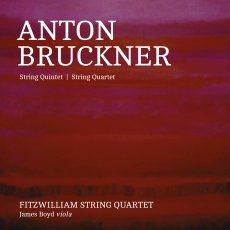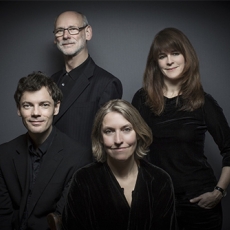Fitzwilliam String Quartet - Bruckner: Quintet & Quartet - Fanfare Magazine
Here is something unexpected but very welcome. The Fitzwilliam String Quartet, in my opinion, is, and has been for many years, Britain's premier string quartet ensemble, but it was largely passed over in favor of a far less deserving group (again, my opinion), the Lindsay Quartet, as a result of marketing promotion and advertising hype that sold record company execs-primarily those from ASV-on engaging the Lindsay in a mission to record vast amounts of the mainstream string quartet literature. Well, now that the Lindsay has hung up its bows and ASV has folded, the Fitzwilliam String Quartet seems to be emerging from the shadows. I mentioned this in a 35:5 review of two rare Decca Eloquence releases that captured the seemingly studio shy Fitzwilliam Quartet in 1980s recordings of quartets by Beethoven and Borodin.
The ensemble was apparently coaxed or cajoled into St. Martin's Church in East Woodhay by Linn Records for this brand new recording of Anton Bruckner's only three chamber works for strings. Depending on how you count, Bruckner's entire contribution to the chamber music genre consists of only three, four, or five entries in his catalog. There's a Duo in E Minor for Violin and Piano, titled Abendklänge, WAB 110, which is not included on the present disc. That's one. Then there are the String Quartet in C Minor, WAB 111, and the String Quintet in F Major, WAB 112, both of which are included here. They count for numbers two and three. The Intermezzo in D Minor, WAB 113, also included here, could be counted as a fourth work, except that it's an alternate movement to the Scherzo in the String Quintet. There is also a seldom heard alternate finale, a Rondo, to the String Quartet, which is not included here, but could be counted as a fifth work. So, to be accurate, maybe we should say that Bruckner composed a total of three and a half chamber works for strings.
Bruckner, as we know, was a late bloomer. When he composed his String Quartet in 1862 at the age of 38, he'd already written a considerable volume of his sacred choral music, including the Requiem in D Minor of 1849 and the Missa solemnis in BI Minor of 1854, but he'd not yet tried his hand at a symphony. The quartet was written as a preparatory exercise in orchestration during Bruckner's studies under Otto Kitzler. The so-called "Study Symphony" in F Minor would come the following year in 1863.
The much later String Quintet with its alternate Intermezzo dates from 1879. By then Bruckner had already produced, at least in their first versions, his first five symphonies. The quintet was no student work. By now Bruckner was a well-recognized, if still misunderstood, composer who was commissioned to write the quintet by Joseph Hellmesberger of the famed Hellmesberger Quartet. It was Hellmesberger who complained that the original Scherzo movement was too difficult, prompting Bruckner to provide the alternate Intermezzo.
But even at that, the first performance of the quintet, which presented only the first three movements, fell to the Winkler Quartet with Josef Schalk on second viola. Hellmesberger, who had requested the Scherzo replacement, didn't perform the work until 1885, and then with the original Scherzo he had initially rejected. In other words, he made Bruckner write the Intermezzo for nothing. Bruckner's notorious insecurity and low self-esteem prevented him from telling Hellmesberger to go to hell, but then, of course, we wouldn't have the highly individual Intermezzo, which sounds like a surreal ballroom dance Schubert might have written had he lived another 50 years.
These works are certainly not new to record. Surprisingly, though, to me at least, is how few of the currently listed versions include all three works...I can report without equivocation that if this music holds any interest for you at all, the Fitzwilliam's new release is the one to have. The playing articulates with great subtlety the Romantic abundance of Bruckner's slow movements-the Adagio to the quintet is especially gorgeous-while not shying away from the bizarre and kinky writing in the scherzos and finales and in the Intermezzo. Linn's recording and the acoustic of the recording venue are ideal.
I hope this release marks the beginning of a new and more active phase of recording for the Fitzwilliam String Quartet, a flagship British ensemble that should be the pride of that nation.

